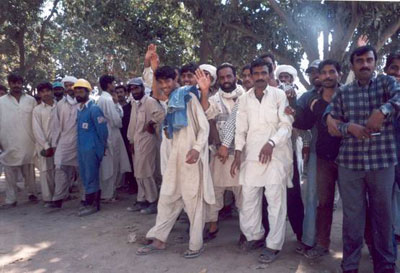
This year, Pakistan’s export of manpower to the Middle East and Libya is expected to go up by as much as 25%, as told in a news post reporting information from the Pakistan Overseas Exporters Promotion Association. In the context of the global economic recession, this news appears to be a blessing for Pakistan. But is it really so? Something contrary may be in view in the not-so-remote future!
Joesph Chamie, director of research at the Center for Migration Studies, presents a brief but compelling view of the global financial crisis, the rising rate of unemployment worldwide, and the manpower export policy of developing countries (read Mr. Chamie’s article). He points to the tightening labor import policies in developed/well-off countries and how these, in the long run, can lead to a bounced-back burden on the economy of the labor exporting countries. Beyond it, there is this risk of political upheaval with the increasing civil instability related to economic hardships. We can interpret Pakistan’s rise in manpower export in the same light.
Statistics given in the news post, published in Daily Times, tell that about 500, 000 people are needed in Saudi Arabia in different workmanship categories and nearly 50, 000 more in Libya; other countries in the Middle East are also in need of manpower. At the moment, according to the mentioned post, about 140 million Pakistani workers are employed in the Middle East and other countries, and the demand is growing.; not only in the Middle East but also in South Korea. With hundreds of thousands more needed abroad for labor, Pakistan’s economy can hope to get a boost for the coming few years by increasing manpower export but things may not work out very well in the long run.
The construction of new Saudi Arabian cities, where most of the new Pakistani laborers will be employed, is to be completed by the end of 2011. Since the Arab countries do not offer nationality to foreign workers neither do they offer any retirement/pension benefits, the returning workforce is going to add to the country’s economic burden. The situation will be especially hard for all if the economic crisis continues and/or gets worse. This scenario also has another side, namely familial needs. Many workers, as they get work abroad, start their families and, upon returning, have to cope with the painful challenge of providing for their family needs in the face of unemployment and/or low wages. These factors imply the need for a sustainable source of income. A helpful measure may be a government program of education on the effective income management for the long-term benefits of overseas Pakistani workers; a program that will also succor the economy of the country.



